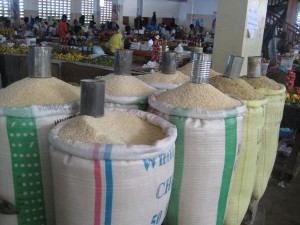Reliance On Rice Importation Will Cost N23.4 trillion
The Minister of Agriculture and Rural Development, Dr Akinwunmi Adesina, has disclosed that the Federal Government about $150 billion (N23.4 trillion) could be spent by 2050 to meet the demand of a population that has an increasing demand for imported rice.
Speaking at the Securities and Exchange Commission (SEC) workshop on Financing Nigeria’s Agricultural Revolution, Dr Adesina said “Nigeria is now the largest importer of rice in the world. As our population rises, demand for rice is projected to rise from the current level of five million MT to 36 million MT by 2050. Unless Nigeria begins an aggressive import substitution programme for rice, it will spend $150 billion annually importing rice by 2050 and the nation will be broke.”
Dr Adesina who has been driving a robust agricultural policy of encouraging and wooing investment and funding of local production in the country, stressed the need for the nation to take a bold step in food security strategies. He says the strategies would make Nigeria self-sufficient in the production of rice by 2015.
He said “To encourage the production and milling of local rice, the Federal Government has raised tariffs on imported brown rice and finished rice. The policy is working. In the last 12 months, 13 new rice mills, with a total capacity of 240,000 MT, have been set up by the private sector.”
The Minister also seized the opportunity at the forum to reveal that the nation now has local rice flooding the market that are as good as the imported rice, some of them include Miva and Ashi rice in Benue, Umza rice in Kano, and Ebonyi rice in Ebonyi.
Efforts by the Ministry of Agriculture in sensitizing Nigerians on the need to begin to value locally produced rice as compared to the imported considering the costs are commendable, but it is expected a more proactive public/private sector partnership will help boost the production of the local rice.
With this assertions made by the Minister a lot has to be done in ensuring that the Commercial and Peasant farmers are encouraged in the production of the local rice and other foodstuffs. China had a robust policy like these and this was able to position them as a leading food producer in the globe.
It is expected that the aggressive agricultural policy unveiled by the ministry will be sustained, this will guarantee not only massive agricultural production and a boost in the sector, but food security.









